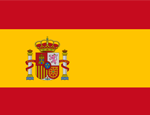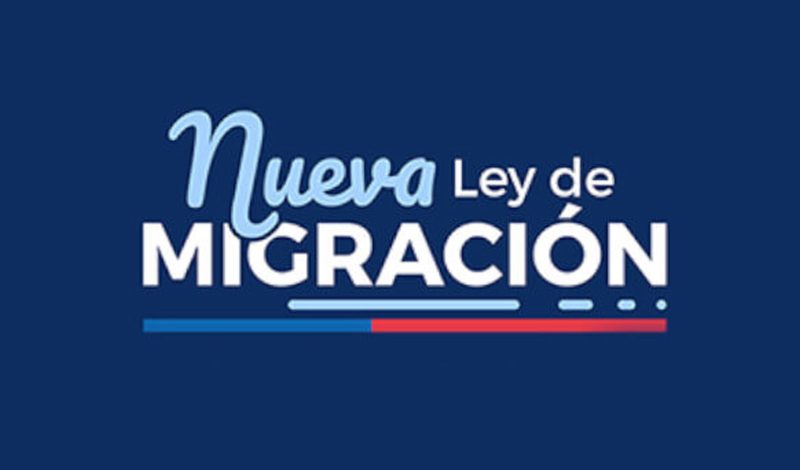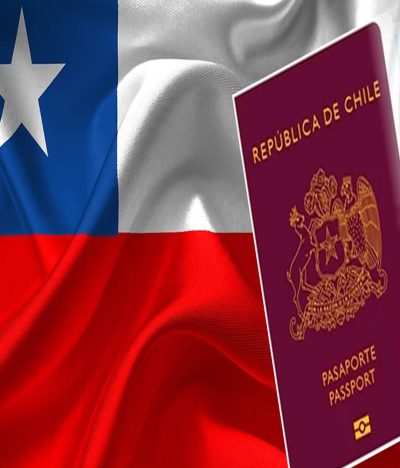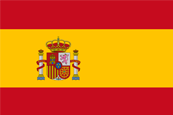It is up to the State of Chile to decide who to admit into its territory. Any foreigner who requests entry or a residence permit in the country will be guaranteed the application of a rational and fair procedure for the approval or rejection of his or her application.
A recent publication by the National Library of Congress explains the rules on the entry and stay of foreigners in Chile.
What is the purpose of the law?
The main purpose of the law and its regulations is to regulate the entry, stay, residence and exit of foreigners from the country, along with the exercise of their rights and duties.
What should the State protect with respect to foreigners?
The State must protect and respect the human rights of foreign persons who are in Chile, regardless of their immigration status.
Every person who is legally in the national territory has the right to move freely within it, choose their residence there and leave the country. However, special rules apply to Rapa Nui and the Juan Fernández Archipelago.
Who decides who can enter Chilean territory?
It is up to the State of Chile to decide who to admit into its territory. Any foreigner who requests entry or a residence permit in the country will be guaranteed the application of a rational and fair procedure for the approval or rejection of their request.
What is the State’s duty regarding immigration information?
It is the State’s duty to provide foreigners with complete, timely and effective information about their rights and duties. In addition, it must provide information about the requirements and procedures for their admission, stay and exit from the country, along with any other relevant information, at least in Spanish, English and sign language.
Who must enter Chile?
The controlling authority must warn the foreigner to indicate the address of his stay at the first contact. If the foreigner does not provide the address of his stay, he must indicate an email address. If the foreigner does not provide an email address, he will not be allowed to enter for not meeting the requirements.
The foreigner must be notified of the beginning of the reported immigration procedure. Any notification made by certified letter addressed to the address of his/her residence or by communication sent to the email address that the foreigner has provided or that corresponds to the last address of his/her residence or the last email address provided to the Service will be valid.
The foreigner must keep the address of his/her residence or email address updated, and inform the Service of any change within 30 calendar days.
What should the Migration and Immigration Policy do?
The National Migration and Immigration Policy must seek the integration and inclusion of foreigners within Chilean society.
What is meant by safe, orderly and regular migration?
The State will promote that foreigners have the authorizations and residence or permanence permits necessary for their stay in the country, and for the development of their activities and the exercise of their rights.
Likewise, it will promote safe migration and actions aimed at preventing, suppressing and punishing the illicit trafficking of migrants and human trafficking, along with ensuring the prosecution of those who commit these crimes.
What subcategories of temporary residence are established?
A supreme decree will define the list and set the requirements for the subcategories of temporary residence. Said decree must cover, at least, the following situations:
1. Foreigners who prove to have family ties with Chileans or with permanent residents.
2. Foreigners who enter the country to carry out legal paid activities, on their own account or under a relationship of subordination and dependence.
3. Foreigners who settle in the country with the objective of studying in educational establishments recognized by the State.
4. Seasonal workers who enter the country for limited periods, unique or for annual seasons, in order to carry out specific seasonal work.
5. Foreigners who apply to Chilean consulates abroad to seek employment opportunities, provided that these are authorized in accordance with the objectives of the National Immigration and Foreign Affairs Policy.
6. Those who are subject to the custody of the Chilean Gendarmerie, due to a criminal sanction or preventive detention.
7. Those who are in Chile by order of Chilean courts of justice, as long as it is necessary for the proper development of the judicial process in which they are a party.
8. Foreigners whose residence in Chile is justified for humanitarian reasons.
9. Foreigners covered by international agreements ratified by Chile and that are in force, which grant temporary residence.
10. Religious members of officially recognized religions.
11. Patients undergoing medical treatment, provided that they prove that they will be responsible for the costs of their medical treatment.
12. Retirees and pensioners.
13. Foreigners who are granted temporary residence under the principle of reciprocity; or who, by virtue of other international treaties ratified by Chile and in force, have the right to such residence.
What are the rights and obligations of foreigners?
The State shall guarantee, with respect to all foreigners, equality in the exercise of rights, without prejudice to the requirements and sanctions established by law for certain cases.
Any foreigner who requests entry or a residence permit in the country shall be guaranteed the application of a rational and fair procedure for the approval or rejection of his or her application, which shall be carried out under non-discriminatory admission criteria.
Foreigners who are affected by an action or omission that constitutes arbitrary discrimination may file the corresponding actions, according to the nature of the right affected.
Are there special considerations?
The State shall ensure that foreigners receive equal protection of the rights established by law, the Political Constitution of the Republic and international treaties on Human Rights ratified by Chile and which are in force.
The law considers the following issues in particular:
Respect and protection for foreign women: Respect for foreign women is established, regardless of their immigration status.
Labor rights: Foreigners shall enjoy the same labor rights as Chileans, without prejudice to the requirements and sanctions established by law for certain cases.
Health: Foreign residents or those with irregular immigration status, whether as holders or dependents, shall have access to health care in accordance with the requirements established by the health authority, on equal terms with nationals.
Social security: Foreigners will be able to access social security benefits and access to fiscal benefits on equal terms with nationals, as long as they meet the requirements established by the laws that regulate these matters.
Education: The State will guarantee access to preschool, basic and secondary education for foreign minors established in Chile, under the same conditions as nationals. Foreigners will be able to access higher education institutions on equal terms with nationals. They will also be eligible for free university education.
Housing: Foreigners who are permanent residents will enjoy the same rights to own their own home as nationals, fulfilling the other legal requirements.
Family reunification: Residents will be able to request family reunification.
What should the National Immigration and Immigration Policy have?
The President of the Republic will define the National Migration and Foreign Affairs Policy, which must take into consideration, at least, the following elements:
1. The local, social, cultural, economic, demographic and labor reality of the country.
2. Respect for and promotion of the human rights of migrants, with special concern for vulnerable groups such as children, adolescents, women, people with disabilities and the elderly.
3. The State’s internal and external security policy, and the safeguarding of public order, especially with regard to the prevention and repression of transnational organized crime, drug trafficking, terrorism, illicit trafficking of migrants and human trafficking.
4. International relations and the country’s foreign policy.
5. The interests of Chileans abroad.
6. The integration and inclusion of migrants, in accordance with the laws and international treaties ratified by Chile and which are in force.
7. The contribution of migration to the social, economic and cultural development of the country.
8. The evaluation of social programs implemented by municipalities that have an impact on the migrant population.
9. The maintenance of high rates of regularity of the migrant population.
The National Migration and Immigration Policy will be reviewed by the Migration Policy Council at least every four years, without prejudice to the power of the President of the Republic to modify it.
How should entry and exit to the national territory be?
The entry of people into and out of the national territory must be carried out through authorized crossings, with travel documents and provided that there are no legal prohibitions regarding it.
What categories of entry exist?
Foreigners may be authorized to enter Chile as holders of a temporary residence permit, or as official, temporary or permanent residents. No requirement
However, for reasons of qualified national interest or for reasons of international reciprocity, prior authorization or a visa granted by a Chilean consulate abroad may be required for nationals of certain countries.
The list of countries whose citizens will be subject to this requirement will be established by supreme decree.
What requirements are there for children and adolescents?
Foreign children and adolescents must enter the country accompanied by their father, mother, guardian or person in charge of the personal care of the minor under 18 years of age; or with written authorization from one of them, from the court or the competent authority, as appropriate.
Which foreigners are prohibited from entering the country?
Foreigners are prohibited from entering the country if:
1. They have been convicted, are being prosecuted, accused, charged or judicially pursued abroad; for belonging to or financing terrorist movements or groups, or who are registered with the International Criminal Police Organization (INTERPOL) for any of the aforementioned acts. This prohibition will also apply to those persons who carry out or have carried out acts that Chilean laws classify as crimes against external security, national sovereignty or internal security.
2. Suffer from illnesses that the health authority determines constitute grounds for preventing entry into Chile, in accordance with the regulations established in the Health Code. The list of illnesses must be established by a previously published exempt resolution.
3. Attempt to enter or leave the country, or have entered or left through an unauthorized passage, evading immigration control or using falsified, adulterated or issued documents in the name of another person, in the previous five years.
4. Have a registered resolution prohibiting entry, or a firm and enforceable order of abandonment or expulsion, which is in force.
5. Have been convicted in Chile or abroad, or are in pending legal proceedings abroad, as reported by INTERPOL or by the justice agencies with which Chile has agreements, for the following crimes: illicit trafficking of narcotics or arms, money laundering, illicit trafficking of migrants or human trafficking, human trafficking, crimes against humanity, genocide, torture, terrorism, homicide, femicide, parricide, infanticide, kidnapping, abduction or abduction of minors, robbery with intimidation or violence, robbery with homicide and robbery with rape; the marketing, production, import, export, distribution, dissemination, acquisition, storage or exhibition of pornographic material, whatever its medium, where minors are used; rape, statutory rape, castration, mutilation and very serious injuries.
6. Have been convicted in Chile for a crime or simple offence, the sentence for which has not been prescribed, or has not been effectively served, except in those cases in which they must re-enter the country in order to serve their sentence.
7. Have been sanctioned with measures prohibiting entry or transit, by a resolution of the United Nations Security Council.
8. Do not meet the entry requirements established in the Migration Law and its regulations, and in the respective decrees that establish the migratory categories.
9. Have contravened fundamental norms of International Law, or are prosecuted or convicted by the International Criminal Court.
Are there other prohibitions?
There are special prohibitions that may apply to those convicted abroad for other crimes or who have a criminal record with INTERPOL, who have been deported from other countries, who make statements, perform acts or carry elements that constitute evidence that they are preparing to commit a crime or simple offense, according to Chilean criminal legislation; or who make statements or carry elements that prove that the reason for their trip is different from that for which the corresponding visa was obtained or entry into the country was requested.
Will there be a limit on entries and exits?
There will be no limit on the number of entries and exits from the national territory that foreign residents can make, as long as the respective residence permit is valid, and the requirements demanded by the law and its regulations are met.
When can they apply for an identity card?
Temporary and permanent residents must apply for an identity card from the Civil Registry and Identification Service within thirty days from the date of entry into force of the respective residence permit.
What is temporary residence?
Temporary residence is the permit granted to foreigners who enter the country without the intention of settling there, which authorizes them to remain in national territory for a limited period.
What is the period of stay?
Holders of temporary residence permits may stay in the country for up to ninety days. The Undersecretariat of the Interior, for reasons of public order, may limit said period to a shorter period, for which it must establish general application criteria, following a report from the Service.
Temporary residence may be extended for up to ninety days, once only, in the manner determined by the regulations. Said extension will be subject to the payment of fees.
In cases of force majeure, the Service may grant a second extension, exempt from payment of fees, for the time strictly necessary to leave the country.
Can they carry out paid activities?
Those who have temporary residence may not carry out paid activities. Exceptionally, those who require carrying out specific and sporadic activities, such as members and personnel of public shows, athletes, lecturers, advisors and expert technicians, may request authorization from the Service to carry out such work.
Foreigners who enter as residents of a border area may also be exempt from this impediment.
Others excluded from this prohibition are those who participate in accredited charitable activities or non-profit activities, exhibitions, fairs or public presentations of industry, art or science; athletes who come to a competition; journalists and media professionals; and participants in traditional, folkloric or popular festivals, with a clear local or regional identification.
What is Official Residence?
Official Residence is the residence permit granted to foreigners who are on an official mission recognized by Chile, and to their dependents.
What is Temporary Residence?
Temporary Residence is the residence permit granted by the Service to foreigners who intend to settle in Chile for a limited time. The Temporary Residence Permit may be granted to those who prove to have family ties with Chileans or with permanent residents; to those whose stay is consistent with the objectives of the National Migration and Immigration Policy; and in other duly qualified cases.
What happens to victims of human trafficking?
Victims of the crime of trafficking who are not nationals or permanent residents in the country, will have the right to submit an application for authorization of a temporary residence for a minimum period of twelve months, to participate in the process or regularize their situation.
What is the term of temporary residence?
The validity of temporary residence will be up to two years, except in the case of the subcategory of seasonal workers. In these cases, it may be valid for up to five years, when limited annual stay periods are established. This permit may be extended for up to two additional years.
Temporary residents may carry out paid activities. Holders of temporary residence may apply for permanent residence, only if the immigration subcategory of which they are holders allows it.
What is Permanent Residence?
Permanent Residence is the permit to reside indefinitely in Chile, which authorizes the development of any lawful activity, with no limitations other than those established by legal and regulatory provisions.
Permanent residence may only be granted to foreigners who hold a temporary residence permit who expressly agree to apply for it and who meet the requirements established by law.
What is tacit revocation?
Permanent residence will be tacitly revoked if its holder leaves the country for a continuous period of more than two years. There is an exception if the interested party requests, before the end of said period, the extension of such residence before the respective Chilean consulate, which will be granted only once and will be valid for two years.
What obligations do employers have?
Only foreigners who are in possession of a residence or stay permit that enables them to work, or who are duly authorized to do so, may be employed.
What sanctions are there?
The law establishes sanctions from the least serious to the most serious.
The least serious infractions have fines in monthly tax units, written warning or prohibition of entry into Chile for 90 days. For the most serious, expulsion from the country is included.
In the case of conduct that receives serious sanctions, the following are contemplated, among others, illegal entry or exit, promotion of illegal entry or exit, and punishments for transport companies that do not comply with the norm.
The warnings and fines will be applied by a reasoned resolution of the National Immigration Service, with the exception of those imposed on official residents, which will be imposed by a reasoned resolution of the Undersecretary of Foreign Affairs.
How is expulsion applied?
Expulsion is the measure imposed by the competent authority, which consists of decreeing the forced exit from the country of the foreigner who incurs in any of the causes provided for in the law for his/her origin.
The expulsion measure may be decreed by a reasoned resolution of the corresponding administrative authority, or by the court with criminal jurisdiction for serious offenses such as entering when prohibited from doing so, remaining in the country despite having expired his/her temporary stay, incurring during his/her stay in Chile in any of the causes indicated by the law to prohibit entry, not complying with an order to leave the country, repeating in carrying out paid activities without authorization, making false statements or adulterating documents before the Chilean authorities.
The expulsion measure will be notified personally or by certified letter addressed to the last address registered with the National Immigration Service or the Chilean Investigative Police, unless the person has registered an email address for notification.
The affected person may be subjected to restrictions and deprivation of liberty once the resolution ordering his/her expulsion is final and enforceable. This measure may only be carried out at the affected person’s home or in police facilities. In no case will this measure be applied to children or adolescents. The affected person may be deprived of liberty only to carry out the expulsion for a maximum period of five calendar days.
What are the grounds for expulsion of residents?
The following are grounds for expulsion from the country for holders of a residence permit:
1. Entering the country despite having been found to be prohibited from entering.
2. Being convicted of serious crimes specified in the law or failing to comply with the requirements for entering Chile.
3. Not having complied with the order to leave the country.
4. Being in Chile despite having had his/her residence permit expire without having requested its renewal within nine months.
What is the National Migration Service?
It is a decentralized public service, endowed with its own legal personality and assets, subject to the supervision of the President of the Republic, through the Ministry of the Interior and Public Security.
The Service will be subject to the rules of the Senior Public Management System.
What functions does the Service have?
1. Carry out the National Migration and Foreign Affairs Policy, together with the actions, plans and programs necessary for its execution.
2. Collect, systematize, analyze and store relevant information on migration in the country.
3. Enter into agreements or conventions with public or private institutions, national, international or foreign, that are directly related to the execution of policies, plans and programs related to foreigners in Chile, with prior authorization from the Undersecretary of the Interior.
4. Authorize or deny the entry, stay and exit of foreign persons to the country, without prejudice to the powers of the Police in these matters.
5. Decide on the granting, extension, rejection and revocation of residence and stay permits, as well as determine their validity, without prejudice to the powers that correspond to the immigration authority abroad.
6. Decide on changes in immigration categories and subcategories for foreigners who so request.
7. Determine the expulsion of foreigners in accordance with the provisions of the law, without prejudice to the powers that correspond to the Undersecretary of the Interior in this regard.
8. Process applications for a letter of naturalization, for resolution by the Minister of the Interior and Public Security.
9. Declare, in case of doubt, whether a person is a foreigner or not.
10. Apply the administrative sanctions that correspond to the offenders of the law and its regulations.
11. Establish, organize and maintain the National Registry of Foreigners.
12. Prepare and develop programs aimed at disseminating and promoting the rights and obligations of foreigners, the procedures necessary to legally remain in the country, and the current National Immigration and Foreign Affairs Policy.
13. Execute the regularization mechanisms for foreigners who are in an irregular immigration status.
14. Perform the remaining functions and exercise the other powers entrusted to it by law and regulations.
What is the Immigration Policy Council?
It is a multi-sectoral body responsible for advising the President of the Republic, through the Minister of the Interior and Public Security, in the development of the National Policy on Migration and Immigration, and in the updating of its content and definitions, according to the needs and requirements of the country.
The Council will be chaired by the Minister of the Interior and Public Security. In addition, it will be made up of the Minister of Foreign Affairs, the Minister of Finance, the Minister of Justice and Human Rights, the Minister of Social Development and Family, the Minister of Health, and the Minister of Labor and Social Security.
The presidents of the most representative municipal associations will also be part of the Council, with the right to speak only.
What functions and powers does the Council have?
1. Advise the President of the Republic, through the Minister of the Interior and Public Security, in the formulation of the National Policy on Migration and Immigration, and its modification.
2. Request progress reports, compliance and implementation of sector plans from the corresponding institutions.
3. Request the Undersecretariat of the Interior, in its capacity as Executive Secretariat, to prepare annual technical reports to public or private, national or international institutions, specialized in migration issues and, especially, related to the migration status of foreigners in Chile.
4. Make recommendations regarding migration matters to public bodies with jurisdiction in the matter.
5. Perform all other functions entrusted to it by law.
What is the National Registry of Foreigners?
The National Registry of Foreigners will be administered by the Service and will be confidential. The organs of the State Administration may access said information in the same capacity, without prejudice to being able to exchange the same information with other states, in accordance with the provisions contained in international treaties ratified by Chile, and which are in force.










